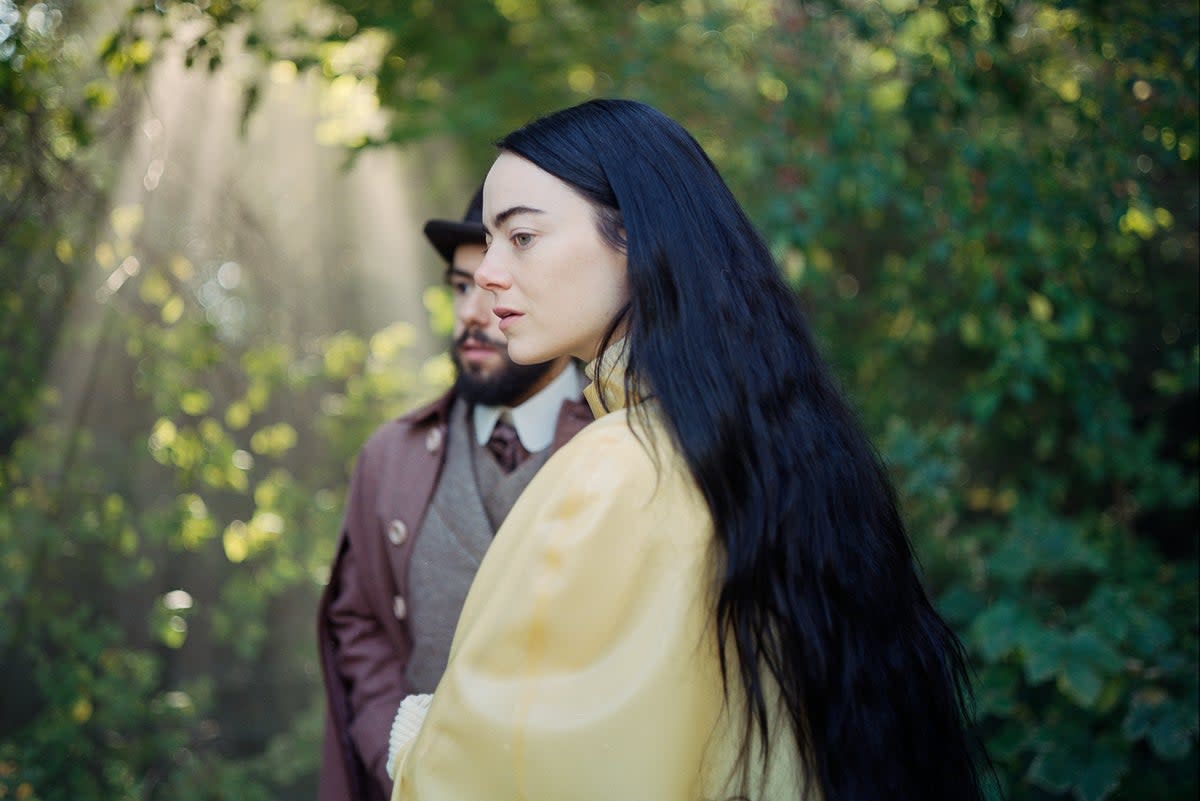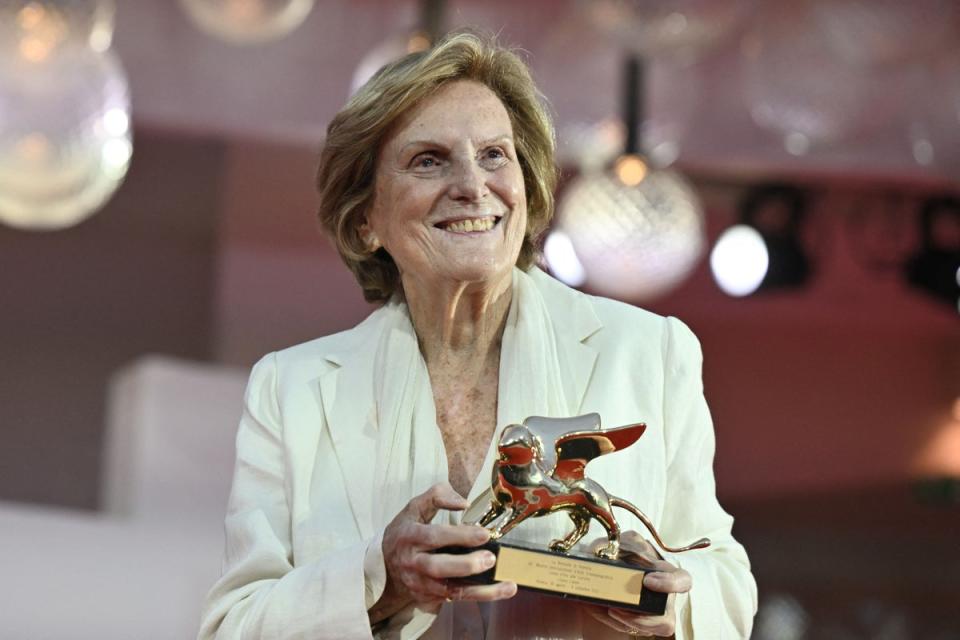Venice Film Festival’s big winners: from Yorgos Lanthimos’ Poor Things to Agnieszka Holland’s Green Border

Venice Film Festival concluded on Sunday after 10 days of screenings, panels, reviews and a few celebrity sightings. So, who were the event’s big winners?
Golden Lion – Poor Things, Yorgos Lanthimos
The biggest winner was Yorgos Lanthimos’ film Poor Things, which won the festival’s most prestigious award: the Golden Lion.
Lanthimos was launched into international stardom in 2019 when his film The Favourite was nominated for nine Oscars, including Best Picture. But the Greek filmmaker had been a favourite of cinephiles long before that – his films Dogtooth (2009), and The Lobster (2015) in particular, were heralded for their strangeness, dark humour and exquisite cinematography.
His latest project, Poor Things, which was described by one reviewer as a “steampunk-retrofuturist Victorian freakout and macabre black-comic horror” is a Frankenstein-style story about a doctor who brings a woman back to life, which stars Emma Stone, Mark Ruffalo, Willem Dafoe, Margaret Qualley, Ramy Youssef and Jerrod Carmichael.
The Standard absolutely loved it, giving the film five stars: “Dealing with issues of patriarchy, ownership and feminism, as well as philosophical debates about human nature, not to mention the thorny issue of prostitution and sexual freedom, this is a fascinating and entertaining ride. Together, Lanthimos and his team of players and crew have conjured up a delight that – like its protagonist – is eccentric, smart, a little dark, lovely to look at and charming as hell.”
Grand Jury Prize – Evil Does Not Exist, Ryusuke Hamaguchi
Japanese director Ryusuke Hamaguchi, whose film Drive My Car was nominated for four Oscars (including Best Picture) and won Best International Feature in 2022, was awarded Venice’s Grand Jury Prize for his latest film, Evil Does Not Exist. It follows the story of a single father and his daughter, whose idyllic life in a Japanese village is threatened by be disrupted by the construction of a tourism glamping site.
Special Jury Prize - Green Border, Agnieszka Holland
Immigration was a key theme at this year’s festival, with two of Venice’s award winners exploring the topic. The first of these was Polish director Agnieszka Holland’s Green Border, a drama which follows the lives of a Syrian refugee family stuck at the Belarus–European border, a border guard and an activist.
The Standard described the film as “astounding”, also giving it five-stars: “Agnieszka Holland reveals the biggest killers of all: not just the Taliban in Afghanistan or Bashar al-Assad in Syria, but the governments and policy makers of Belarus, Poland and the EU, whose heinous treatment of asylum-seekers is depicted so graphically here.”
Holland’s directorial credits include episodes of the TV shows The Wire, The Killing, House of Cards, The Affair, but she had made as many as 26 films before embarking on these small-screen projects, including Golden Globe winning Europa Europa (1990) and The Secret Garden (1993). In 2020 she became president of the European Film Academy.
Silver Lion for Best Director – Io Capitano, Matteo Garrone
Italian filmmaker Matteo Garrone won Best Director for his latest project, Io Capitano (I am captain), which was nominated for 13 trophies at the Italian festival, winning a whopping 12. The film follows two young Senegalese men, Seydou and Moussa, who are making the treacherous journey from Dakar to Europe.
Garrone, who directed award-winning films Gomorrah (2008) and Reality (2012), used accounts of people who had made the journey to steer the film. “We decided to orient the camera from their perspective so as to tell this contemporary odyssey from their point of view,” he explained. Seydou Sarr, one of the stars of the film, won the Marcello Mastroianni Award for best young actor.
Lifetime Achievement – Liliana Cavani

Italian director Liliana Cavani is arguably best known for her 1974 thriller The Night Porter, a story about the hardcore sexual relationship between an ex-SS prison guard and his former prisoner, which to this day divides critics. But the filmmaker has made 17 other films over her six-decade career, including Francesco (1989) and Ripley’s Game (2002).
“I am very happy and grateful to the Biennale di Venezia for this wonderful surprise”, said Cavani when she accepted the offer of the lifetime award.
Best Screenplay – El Conde, Pablo Larraín
Chilean director Pablo Larraín is best known for directing Jackie (2016) and Spencer (2021), and he has also worked as a producer on Gloria (2013), Nasty Baby (2015), and A Fantastic Woman (2017).
Now he has turned his hand to a gothic black comedy, El Conde (or in English, The Count). Jaime Vadell plays a vampire version of Augusto Pinochet (the fascist dictator who ruled Chile from 1973 to 1990) who now longs to die.
“I have spent years imagining Pinochet as a vampire, as a being that never stops circulating through history, both in our imagination and nightmares,” said Larraín in a statement about the film. “Vampires do not die, they do not disappear, nor do the crimes and thefts of a dictator who never faced true justice.
“Together with my collaborators on the film, we wanted to show the brutal impunity that Pinochet represents.For that, we have used the language of satire and political farce, where the General suffers an existential crisis.”
Best and worst reviews
The Standard was in agreement with the film festival, giving its most ebullient review to Lanthimos’ Poor Things. It also thoroughly enjoyed Bradley Cooper’s Maestro, but panned Roman Polanski’s The Palace.
Maestro
There was a huge amount of buzz around Maestro at every step of its development: not only is the biopic about one of America’s most beloved composers, Leonard Bernstein (who composed the Broadway musical West Side Story), but it has been directed by Oscar-nominated director Bradley Cooper, and stars Cooper alongside Carey Mulligan. The Standard gave the highly-anticipated film four-stars, and praised Copper, saying, “The actor-director (and co-writer/producer) has pulled off something special, while Carey Mulligan puts in a career-best performance.”
The Palace
On the other end of the scale was Roman Polanski’s The Palace, which, despite receiving a three-minute standing ovation, was near-universally deemed an utter dud by the critics. “That the man who brought us The Pianist and Chinatown could come to this is genuinely upsetting,” said the Standard in its one-star review.
There had already been much furore about festival director Alberto Barbera’s decision to allow 90-year-old Polanski to screen his film out of competition at Venice. Then, despite a reasonable premise – the film follows the shenanigans of guests a luxury hotel in Switzerland on the eve of the millennium – and a reasonably starry cast – Oliver Masucci, Fanny Ardant, John Cleese and Mickey Rourke feature – when the black comedy was screened, critics found it totally, horrendously, unwatchable, describing it as “dismal” and “an eye-scorching atrocity”.
“Critics were leaving the screening traumatised by what they had just seen,” said the Standard’s Jo-Ann Titmarsh. “Reader, I sat through this film until the bitter end because it’s my job. You are under no obligation to do so.”

 Yahoo Movies
Yahoo Movies 
